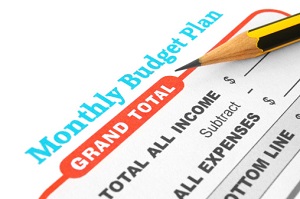 Congratulations, you have successfully completed your bankruptcy and you are ready to take your first steps on the road to rebuilding your finances. A very important element of any sound financial plan is budgeting. Some people believe that budgeting is too difficult or that budgeting is only a way of denying yourself what you truly want. On the contrary, budgeting makes it possible for you to achieve the things you want by helping you manage your money. Budgeting can also help you save more money by revealing any issues or incongruences between your income and your expenses.
Congratulations, you have successfully completed your bankruptcy and you are ready to take your first steps on the road to rebuilding your finances. A very important element of any sound financial plan is budgeting. Some people believe that budgeting is too difficult or that budgeting is only a way of denying yourself what you truly want. On the contrary, budgeting makes it possible for you to achieve the things you want by helping you manage your money. Budgeting can also help you save more money by revealing any issues or incongruences between your income and your expenses.
Let’s look at budgeting tips that can help make your finances stronger.
1. Credit Card Use
Our first budgeting tip is to limit the number of credit cards that you have, and only use them for emergencies. After bankruptcy it is best practice to only spend what you can afford to pay off immediately. Another budgeting tip would be to apply for and use a prepaid credit card - - you can only spend the money that you have deposited with the credit card company. It is very easy to use credit cards and lose track of the amount spent on each; a prepaid card will help keep you within your spending budget.
2. Medical Bills
More and more individuals are being forced to file bankruptcy due to unpaid medical bills. A medical emergency is something that no one expects; however, you can take steps now to avoid debt problems in the future caused by medical bills. If you do not have health insurance, begin researching options with several different companies including the government’s Health Insurance Market. You may also qualify to participate in a FSA or HSA through your employer, whereby you can deduct pre-tax dollars to deposit into a health savings account.
3. Emergency Fund
It may seem impossible to save money when your paycheck is stretched tight from week to week; however, having an emergency fund will help you avoid going into debt when emergencies happen. Medical emergencies, car repairs, job loss, home repairs and other unexpected expenses can happen at any time, without warning. Without an emergency fund, you may have no choice but to borrow money at astronomically high interest rates, taking you right back into debt. Pay yourself each month by placing an amount in your budget that is earmarked for savings. If possible, have the amount deducted from your pay and directly deposited into a savings account that is not tied to your checking account and that has no debit card.
4. Set and Use Goals to Your Advantage
Setting goals can help you in several ways. Having realistic long-term financial goals gives you something specific and tangible to work toward. Knowing that all of the work you are doing now, and the little choices that you make each day to save money or cut expenses will add up to something you really want, will make budgeting worthwhile in the short term. Likewise, you want to have short-term goals that go along with your long-term goals. Having short-term goals that you can easily achieve when you stay within your budget gives you a sense of accomplishment and encourages you to keep working toward your long-term financial goals.
5. Be Flexible
Having a budget does not mean that you will never need to make adjustments. As you are learning to budget, you are likely to find items that need to be adjusted or added because you forgot to budget them initially. Do not panic and do not give up. Simply go back to your plan and make the necessary adjustments. This is a normal part of learning to budget that everyone goes through in the beginning. You’ll only get better at creating and then sticking to your budget as you gain experience.
6. Examine Your Support Group
Whenever you are making a significant change in your life, it is helpful to have positive support. If you are surrounded by people who constantly overspend, you are in the midst of negative support. This negative support will make it much more difficult to stick to a budget. Seek positive support from friends and family who are as dedicated to making smart money choices as you are, now that you are living within a budget.
7. Review Your Credit Counseling and Financial Education Courses
The required bankruptcy courses that you completed as part of your bankruptcy are a great source for budgeting tips. The courses are designed to help debtors learn how to budget and manage money so that they can have a stronger financial future. Review the lessons and information contained in these courses and incorporate the budgeting tips into your lifestyle.
If you are currently experiencing a financial crisis and would like to talk to someone, without obligation or judgment, request a bankruptcy consultation. This doesn’t mean you have to file bankruptcy, we are here to help you find the right solution for your financial struggle – whether it is through bankruptcy or not.



